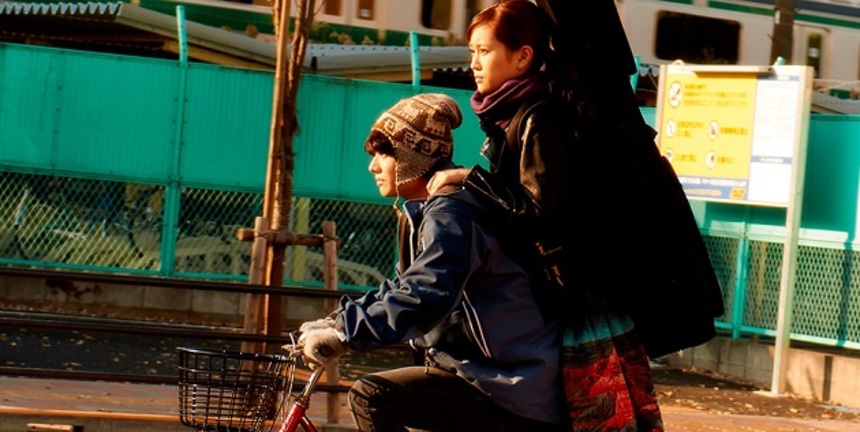Busan 2014 Review: KABUKICHO LOVE HOTEL, A Raunchy Charmer

Although the film contains the sprawling metropolitan malaise that permeates his contemporary films, this is a far more accessible and crowd-pleasing effort that plays as both charming and sexually charged. The famous red-light district of Kabukicho in Shinjuku is not glamorised or stylized, and yet the location is powerfully presented. The bright and cheery morning turns to the seedy night as the film is told in a 24-hour period.
The film, an ensemble piece, follows various couples who, through fate or happenstance, are woven into a larger story set predominantly in a love hotel. Some of the characters already work there, like the down-on-his-luck hotel manager Toru (Sometani Shota) and the cleaning lady (Minami Kaho) who harbours a dark secret. Others arrive at the venue in various interesting ways.
The film's mainstream elements become particularly noticeable in casting. This is a youth-centric film, reflected in the casting of pop-stars such as Atsuko Maeda (AKB48) and Roy (5tion) as supporting roles. Other notable characters outside the hotel include a delivery girl (escort) named Heya, played by Korean actress Lee Eun-woo, whose previous roles include the mother in Kim Ki-duk's Moebius. Lee shines in the film, providing a good dose of drama and sex appeal. Her portrayal as an escort is a layered and considered one as she balances an authentic relationship.
There are a handful of other characters that are given the screen time they deserve, and as the day progresses, everybody starts to connect in both inane and purposeful ways. Their connections drive their desires and goals in life, as they all struggle with identity, reasoning and relationships. The film makes no sweeping statements, it simply presents the realities of life with a more realistic slant than perhaps called for. Another example is the film's heavy focus on the running of the love hotel; Toru manages his rag-tag group of employees with disdain and disinterest, but administration and security take centre stage as the day wears on and there is a glimpse into the work involved in managing such a liminal place.
Hiroki ensures that each interaction is meaningful and entertaining; running the gamut from hilarious to heart-breaking. It has been somewhat of a hiatus since Japan has tackled a multi-strand film, and although Kabukicho Love Hotel is not epic, it certainly is ambitious. The film is informed by Japanese cinema of the early 2000's; it has a message, but it is the characters and near-slapstick level encounters that really drive the plot.
It is endearing that films of this ilk are still being made in Japan; Hiroki has provided a much-needed confidence boost to contemporary Japanese narratives, fighting to preserve well-paced Tokyo-centric tales. The characters do not feel entirely central; it is the time and place that matters most and Hiroki perfectly balances their importance with the situations they find themselves in as observers, victims and benefactors. These situations range from the absurd to the banal; from troublesome customers in the hotel to a sudden police involvement.
The film also covers various social problems in Japan through the clever and relevant plots that unfold; these moments are sometimes heavy-handed but serve to inform the greater narrative of the Japanese psyche in this unusual place. These separate stories eventually graft in strange and wonderful ways, but there is not always a happy ending as mistakes and melancholy haunt each character, impacting their uncertain future.
Kabukicho Love Hotel is in many ways a fresh start for Hiroki. His more conventional fare and his soft-core background come to a head, creating not only an entertaining drama, but a hybrid production that has positive attributes of both old and new Japanese cinema.

Do you feel this content is inappropriate or infringes upon your rights? Click here to report it, or see our DMCA policy.






